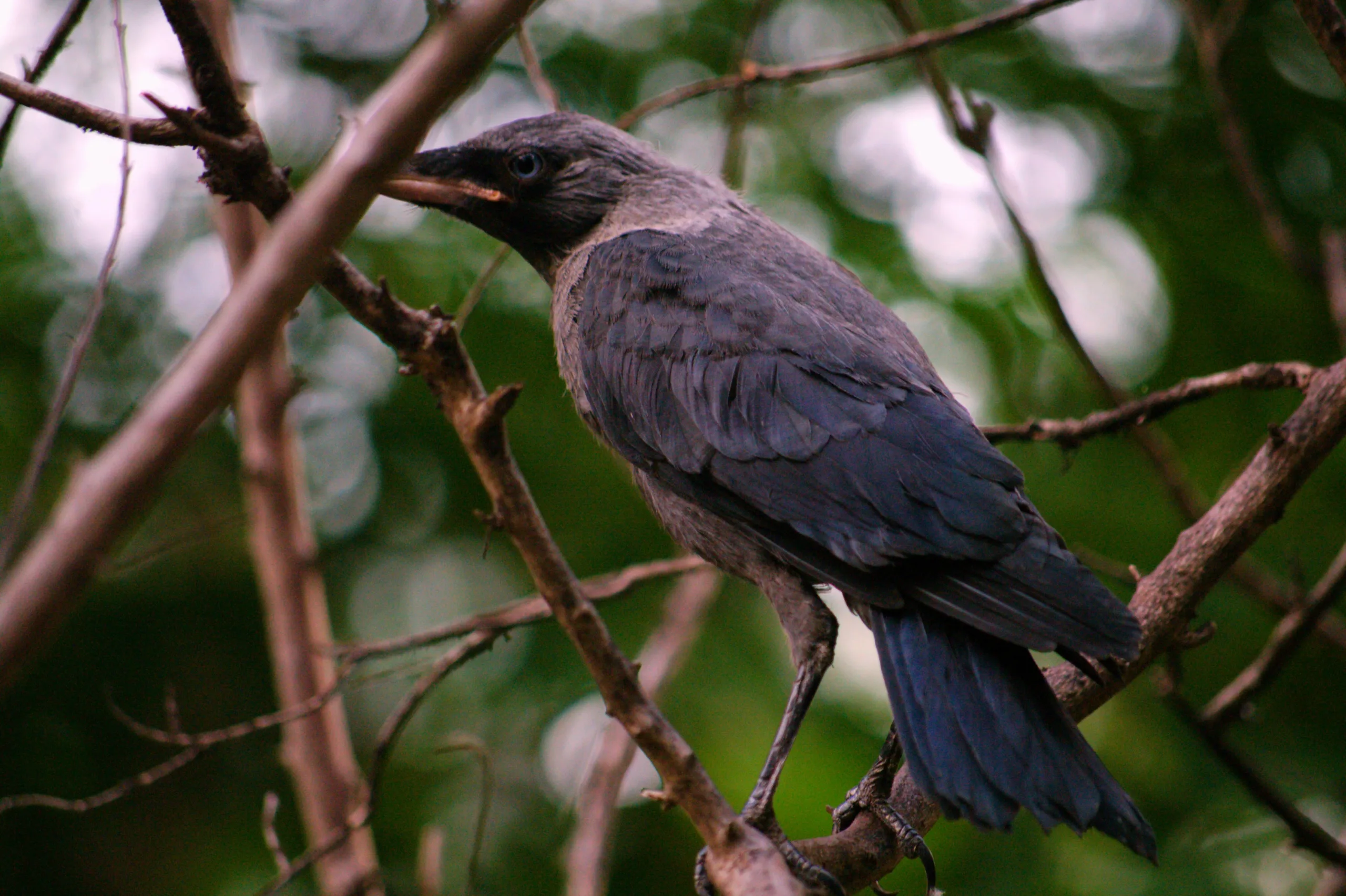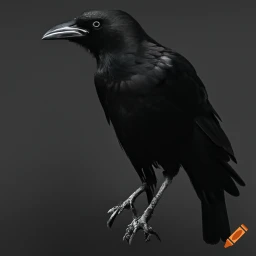Unlocking the Secrets: Deciphering the Significance of Seeing a Black Crow
December 30, 2023 | by BlackCrow.com

The Mysterious Black Crow
Introduction to Black Crows
The black crow, a member of the Corvus genus, is a fascinating and enigmatic bird that has captured the curiosity and imagination of humans for centuries. With its glossy black feathers and intelligent demeanor, the black crow stands out in the avian world.
Black crows are found in various parts of the world, including North America, Europe, Asia, and Australia. They are known for their adaptability and can thrive in a range of habitats, from urban areas to forests and fields. Some common species of black crows include the Indian Paradise Flycatcher (as Corvus paradisi), Indian Roller (as Corvus benghalensis), Magpie-Lark (as Corvus cyanoleucus), Western Jackdaw (as Corvus monedula), Eurasian Jay (as Corvus glandarius), and Daurian Jackdaw (as Corvus dauuricus).
Symbolism and Folklore
Black crows have long been associated with symbolism and folklore in various cultures around the world.
In many cultures, black crows are seen as symbols of intelligence, adaptability, and resourcefulness. They are often associated with wisdom and are believed to possess a deep understanding of the natural world. Some cultures consider black crows to be messengers between the living and the spirit world, bringing guidance and insights to those who encounter them.
To explore the cultural significance of black crows further, check out our article on black crows in different cultures. Understanding the symbolism and folklore surrounding black crows can shed light on the diverse perspectives and interpretations associated with these mysterious birds.
Cultural Significance
Black crows hold a significant place in various cultures around the world, often symbolizing different meanings and beliefs. Let’s explore the cultural significance of black crows and the superstitions and beliefs associated with them.
Black Crows in Different Cultures
Black crows have been featured prominently in the folklore and mythology of many cultures. In some cultures, these birds are considered sacred. For example, in Hindu mythology, the black crow is associated with the Indian Paradise Flycatcher (Corvus paradisi) black crow. Meanwhile, the Indian Roller (Corvus benghalensis) is known as the “Neelkanth” or “Blue-throated” crow, and it holds cultural significance in certain regions of India. The Magpie-lark (Corvus cyanoleucus) blackcrow is another bird that sometimes shares the name “black crow” in various cultures, such as in Australia.
Superstitions and Beliefs
Black crows are often associated with positive symbols, representing intelligence, insight, or even divine guidance.
It’s important to note that these superstitions and beliefs are deeply rooted in cultural traditions and may vary widely from one culture to another. While some people may interpret the sighting of a black crow as significant, others may not attach any particular meaning to it. It ultimately depends on personal beliefs and cultural background.
Exploring the cultural significance of black crows adds depth to our understanding of these mysterious creatures. However, it’s essential to approach these beliefs with an open mind and respect for diverse cultural perspectives.
Interpretations of Seeing a Black Crow
Seeing a black crow can hold various interpretations and meanings that have been passed down through different cultures and belief systems. While interpretations may vary, there are some common messages associated with the sighting of a black crow.
Messages and Meanings
- Transformation and Change: The presence of a black crow may symbolize imminent changes or the need for personal transformation in your life. It could be a sign to embrace new beginnings and let go of old habits or beliefs that no longer serve you.
- Intuition and Insight: Black crows are often associated with heightened intuition and the ability to see beyond the surface. Seeing a black crow may indicate that you should trust your instincts and rely on your inner wisdom when making decisions.
- Spiritual Guidance: In some cultures, black crows are seen as spiritual messengers. The sighting of a black crow could be a sign that you are being guided or protected by unseen forces. It may be an invitation to connect with your spiritual side or pay attention to spiritual messages.
- Symbol of Rebirth: In certain folklore and mythology, black crows with rebirth. Seeing a black crow could represent the end of a phase in your life or the beginning of a new chapter.
Personal Reflection and Intuition
While there are common interpretations of seeing a black crow, it’s important to remember that personal experiences and intuition play a significant role in deciphering the meaning behind such sightings. Reflecting on your own thoughts, feelings, and circumstances at the time of the sighting can provide valuable insights into the significance of the encounter.
Consider the following questions:
- What were you thinking or feeling when you saw the black crow?
- Did the sighting occur during a significant event or moment in your life?
- Are there any personal associations or beliefs you have about black crows?
Taking the time to journal or meditate on these questions can help you uncover the personal symbolism and meaning behind the sighting of a black crow. Trusting your intuition and paying attention to synchronicities can guide you towards a deeper understanding of the message that the black crow may be bringing to your life.
Remember, interpretations of seeing a black crow are subjective and can vary from person to person. It’s essential to trust your own instincts and beliefs when ascribing meaning to these encounters. If you’re interested in learning more about the spiritual symbolism of birds, check out our article on black crow spiritual meaning.
Nature and Ecology
Understanding the behavior and ecological importance of black crows can provide insights into their significance when encountered. Let’s explore the behavior of black crows and their ecological role.
The Behavior of Black Crows
Black crows, scientifically known as Corvus species, exhibit fascinating behavior patterns. These highly intelligent birds are known for their adaptability and ability to thrive in diverse environments. Some common behavior traits of black crows include:
- Social Structure: Black crows are highly social birds that form large groups, known as murders, especially during non-breeding seasons. Within these groups, they establish hierarchies and communicate with a complex range of vocalizations.
- Foraging and Feeding Habits: Black crows have a diverse diet, consisting of both plant and animal matter. They are opportunistic feeders and can scavenge for food, steal from other birds, or even hunt small animals. Their adaptability allows them to thrive in various habitats.
- Nest Building and Breeding: Black crows construct sturdy nests using twigs, branches, and other materials. They are monogamous and form long-term pair bonds. Breeding occurs during spring, and both parents share the responsibilities of incubation and raising their young.
- Intelligence and Problem-Solving: Black crows are known for their exceptional problem-solving skills. They can use tools, remember specific locations for food storage, and demonstrate advanced learning abilities. Their intelligence is a testament to their survival and adaptability.
Ecological Importance
Black crows play a vital role in the ecosystem due to their feeding habits and foraging behavior. Some ecological contributions of black crows include:
- Scavenging and Waste Disposal: Black crows help maintain the cleanliness of their surroundings by scavenging carrion and consuming organic waste. This role contributes to the overall health of ecosystems and assists in preventing the spread of diseases.
- Seed Dispersal: As black crows consume a variety of fruits and seeds, they aid in seed dispersal. By ingesting and subsequently depositing seeds in different locations, they facilitate the growth and distribution of plants across ecosystems.
- Predator Control: Black crows are opportunistic predators, and they often prey on smaller animals such as insects, rodents, and other birds. Their presence helps regulate populations of these species, maintaining a balanced ecosystem.
- Cultural and Spiritual Significance: Black crows have long held cultural and spiritual significance in various societies around the world. Visit our article on black crow meaning to explore the symbolic interpretations associated with black crows.
Understanding the behavior and ecological importance of black crows adds a layer of appreciation for these intriguing birds. While encountering a black crow may hold personal meaning or symbolism, recognizing their role within the natural world allows us to appreciate their presence in our surroundings.
Encountering Black Crows
Black crows have long fascinated and intrigued people with their mysterious presence. If you find yourself encountering black crows in various situations, it can be helpful to understand common scenarios and how to respond to these sightings.
Common Situations
Black crows can be spotted in a variety of settings, both in urban and natural environments. Here are some common situations where you might come across these enigmatic birds:
- In your backyard or garden: Black crows are known to inhabit residential areas, and you may spot them perched on trees or hopping around your backyard. They are often attracted to food sources like bird feeders, garbage bins, or open compost piles.
- During your commute: Crows are highly adaptable and can be seen in urban areas, including parks, parking lots, and even bustling city streets. They may congregate in groups, known as a “murder” of crows, particularly in open spaces or near food sources.
- In natural habitats: Black crows are prevalent in various natural environments such as forests, fields, and wetlands. They are resourceful foragers and can be found scavenging for food, building nests, or socializing with other crows.
- At landmarks or historical sites: Black crows are often associated with certain landmarks or historical sites due to their symbolic significance in folklore and mythology. It is not uncommon to encounter black crows while exploring these places.
Responding to Black Crow Sightings
When you see a black crow, it can evoke different emotions and interpretations. Here are some general guidelines for responding to black crow sightings:
- Observe their behavior: Pay attention to the crow’s actions and vocalizations. Crows are highly intelligent creatures with complex social structures. Their behaviors can provide insights into their interactions with their environment and other crows.
- Appreciate their ecological role: Black crows play an important ecological role as scavengers and predators, helping maintain the balance of the ecosystem. Take a moment to appreciate their contribution to the natural world.
- Respect their space: While crows are generally adaptable to human presence, it’s important to respect their space and avoid disturbing them unnecessarily. Keep a safe distance and observe without causing any harm or stress to the birds.
- Avoid feeding them: Feeding black crows can create dependency and disrupt their natural foraging behaviors. It’s best to let them find their own food sources to ensure their overall well-being.
- Stay informed: Educate yourself about the local laws and regulations regarding interactions with black crows. In some areas, crows may be protected, and certain actions may be prohibited or restricted.
Remember, the presence of black crows can hold personal and cultural meanings that may vary from person to person. It’s essential to approach these encounters with an open mind and respect for the birds and their significance. If you’re interested in learning more about the symbolism and folklore surrounding black crows, refer to our earlier sections on symbolism and folklore and cultural significance.
RELATED POSTS
View all


